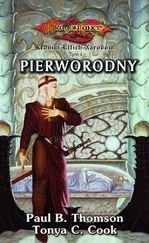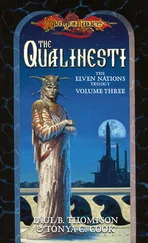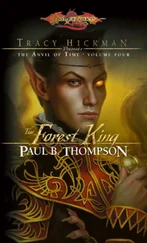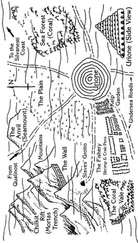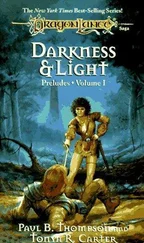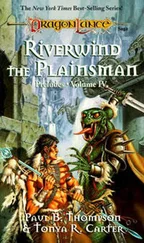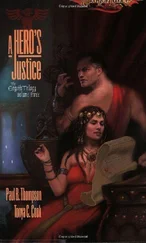There was a great hole in the floor, nearly as wide as the tunnel. He dropped a bone chip into the hole. His keen ears never heard the chip hit bottom.
As he turned to go, the air around him trembled once then again. A loud boom echoed down the passageway.
The Speaker heard it as well and demanded to know what was happening. A wind had begun to blow, Hytanthas told him. The mist was being drawn down the pit. The pull was strong. it tossed Hytanthas’s long hair and dried the dampness from his clothes. When all the mist was gone, the wind ceased.
“I see light in the hole!” Hytanthas exclaimed. Deep within was a pale white glow. It showed him the sides of the shaft were polished smooth and free of embellishment.
When a minute passed with no other occurrences, Hytanthas turned and retraced his steps to the crossing tunnel.
He had no idea what might be in the deep hole, but as he walked, a more pressing question came to his mind. The rush of air suggested the tunnels had been unsealed somewhere. The last time that happened, he had heard the Speaker’s voice. Who knew what had been admitted into the tunnels?
Caressed by the soft light of ten thousand stars, the stone scrolls softened, opening one by one like exotic flowers. Never before had Favaronas laid them all out at once. A trained librarian never opened books he knew he would not have time to read because even the finest vellum inevitably cracked with use. The scrolls were even more delicate than most, despite their rock-solid appearance. He had no way of knowing how many times the stone could soften, open, and harden again. Overuse might destroy them. But Faeterus wasn’t concerned with such niceties. He’d ordered all the cylinders placed where starlight would work its magic on them.
The climb to the Stair had proven too much for them to complete in a day. They were still several hundred yards short of their goal when Favaronas collapsed. As the sorcerer’s hand was still joined to Favaronas’s arm, Faeterus dropped with him. The archivist’s exhaustion was no ploy; he couldn’t go a step farther without rest. Food and water would have strengthened him, but Faeterus offered none. He did sever their unnatural bond. As Favaronas slid into sleep, he was grateful for that small blessing.
Awakening after nightfall, Favaronas found the sorcerer’s manner much changed. Having rid himself of Sahim-Khan’s bounty hunter, destroyed (so he thought) an elf griffon rider, and with the Stair of Distant Vision in reach, Faeterus was more relaxed, even expansive. When he asked Favaronas to read from the scrolls his voice sounded much less arrogant than usual. Favaronas was emboldened to ask, with all deference, why Faeterus didn’t read them himself.
“Their meaning is shielded from my eyes by a very old and potent ward.”
Storing away that bit of knowledge, Favaronas knelt to study the scrolls. Faeterus had forbidden a fire—no sense attracting potentially unfriendly attention—but cast an illumination spell around Favaronas to brighten the air enough to permit reading.
As the archivist feared, the randomly collected cylinders belonged to different chronicles. None was a continuation of any of the others. In addition to the one he’d already sampled, the second contained a record of the original inhabitants’ attempts to foil the powers that confined them. It bore the cryptic title Ten Thousand and One, and interested Faeterus greatly.
The scroll began midsentence. The inhabitants of the valley had employed many methods to catch and destroy the lights that patrolled the valley. The lights were referred to variously as “night wardens,” “watchers,” and “vigilants.” Many were caught in nets and other traps, but it made no difference. However many will-o’-the-wisps were caught, the next night saw no shortage. Two of the valley’s inhabitants, Stabo and Mexas, engaged in a long debate on their captors’ nature. Stabo claimed flew lights were created every night, so capturing any was pointless. Mexas countered that their number was fixed, although not all appeared at any one time. If enough could be captured, the total would lessen.
When Favaronas showed a tendency to dwell on the scroll’s long-winded recitation of the disagreement between Stabo and Mexas, Faeterus commanded, “Spare me these mediocrities,” and Favaronas skipped ahead.
Anyone who entered Inath-Wakenti eventually was taken by the lights, according to the scroll; the inhabitants were immune to them unless they tried to leave. Then it was noticed the animals were disappearing. The beasts were not trying to leave, yet their number steadily diminished. Facing starvation, the prisoners (as Favaronas had begun to think of them) tried tunneling out. They dug miles of passages beneath the blue-green soil, but the lights found them there too.
The scroll ended there. Still curious, Favaronas asked, “Is that how they died?”
“Eventually. They could not live off each other’s flesh forever.”
Favaronas turned away, aghast at the horror Faeterus revealed so casually. The archivist silently bemoaned his foolishness in returning to this place. He had been safely in the company of Glanthon and his warriors, outside the valley’s dreadful influence, and he’d thrown that safety away for the hope of power. If he managed to survive, he would confess his crimes to the Speaker and beg forgiveness. Whatever punishment was meted out, Favaronas would embrace it with joy.
The final scroll had the shortest text of the three—a stanza of verse. When Favaronas began a halting translation, the sorcerer surprised him by quoting the lines in full. Hooded head tilted up toward the starry sky, Faeterus recited.
The sun’s eye grows dark, No moon loves him.
The stars sleep and answer not the night. Until The father holds the keg in his hand,
standing before the Door
And reads the Holy Key.
From the Stair of Distant Vision,
under the sun’s black eye
The Door is opened. The Light revealed
Burns all, consumes all, kills all
Unwraps the flower, cracks the egg
Pulls the seed from the ground.
If the Holy Key is broken.
In Elvish, each line had the same number of syllables which made it doggerel by the standards of Silvanesti poesy. Favaronas commented on its poor quality.
Faeterus chuckled deep in his throat. “Not good poetry perhaps but excellent prophecy, elf spawn.”
With that, he rose and ordered Favaronas to do likewise. The archivist intended to roll the still-soften scrolls carefully for transport, but as soon as his fingers touched one, it disintegrated. Cracking and popping like sheets of softening ice, each scroll fell into shards that crumbled further and further until only a fine white dust remained. The archivist turned a stricken face to his captor, but Faeterus only shrugged.
“I shouldn’t have spoken the words aloud. It matters little now. The play is nearly done.”
The illumination spell ended, and Faeterus reached toward Favaronas.
Shying from his touch, Favaronas hurried up the mountainside as quickly as he was able.
The pebbly soil crumbled under their feet, tampering their progress. In firmer patches of ground Favaronas caught sight of Faeterus’s unbroken footprints-broad but short, with only three thick toes. Wedge-shaped impressions at the front of each toe print were made by his clawlike nails. When he’d glimpsed the sorcerer’s foot during the trek across the valley, it had sported four toes. Now it had only three. The sorcerer seemed to be losing his elf appearance perhaps reverting to his natural form, a notion that only fueled his captive’s terror. There was no saying what sort of creature Faeterus might truly be.
They reached a level place and Faeterus halted. Favaronas immediately collapsed, determined to rest for however long he was allowed. Looking around, he realized this was no narrow ledge, but a large open space. Other features were difficult to discern. His eyes were so tired, he had trouble focusing in the dark. His silent speculations came to an end when Faeterus spoke.
Читать дальше

